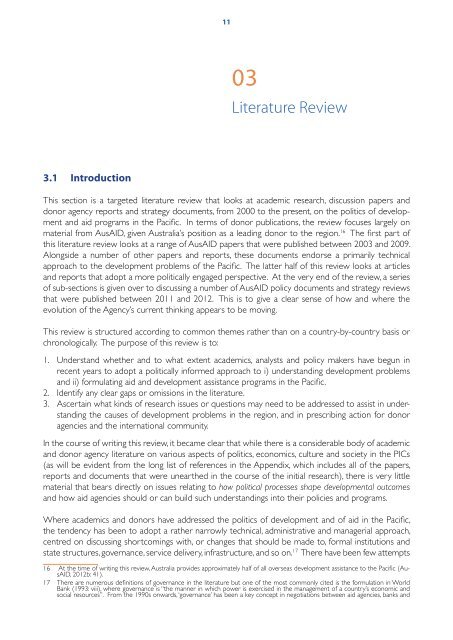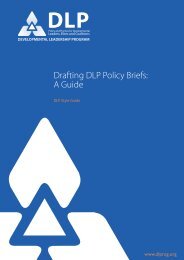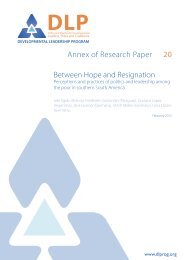VIEW - The Developmental Leadership Program
VIEW - The Developmental Leadership Program
VIEW - The Developmental Leadership Program
You also want an ePaper? Increase the reach of your titles
YUMPU automatically turns print PDFs into web optimized ePapers that Google loves.
1103Literature Review3.1 IntroductionThis section is a targeted literature review that looks at academic research, discussion papers anddonor agency reports and strategy documents, from 2000 to the present, on the politics of developmentand aid programs in the Pacific. In terms of donor publications, the review focuses largely onmaterial from AusAID, given Australia’s position as a leading donor to the region. 16 <strong>The</strong> first part ofthis literature review looks at a range of AusAID papers that were published between 2003 and 2009.Alongside a number of other papers and reports, these documents endorse a primarily technicalapproach to the development problems of the Pacific. <strong>The</strong> latter half of this review looks at articlesand reports that adopt a more politically engaged perspective. At the very end of the review, a seriesof sub-sections is given over to discussing a number of AusAID policy documents and strategy reviewsthat were published between 2011 and 2012. This is to give a clear sense of how and where theevolution of the Agency’s current thinking appears to be moving.This review is structured according to common themes rather than on a country-by-country basis orchronologically. <strong>The</strong> purpose of this review is to:1. Understand whether and to what extent academics, analysts and policy makers have begun inrecent years to adopt a politically informed approach to i) understanding development problemsand ii) formulating aid and development assistance programs in the Pacific.2. Identify any clear gaps or omissions in the literature.3. Ascertain what kinds of research issues or questions may need to be addressed to assist in understandingthe causes of development problems in the region, and in prescribing action for donoragencies and the international community.In the course of writing this review, it became clear that while there is a considerable body of academicand donor agency literature on various aspects of politics, economics, culture and society in the PICs(as will be evident from the long list of references in the Appendix, which includes all of the papers,reports and documents that were unearthed in the course of the initial research), there is very littlematerial that bears directly on issues relating to how political processes shape developmental outcomesand how aid agencies should or can build such understandings into their policies and programs.Where academics and donors have addressed the politics of development and of aid in the Pacific,the tendency has been to adopt a rather narrowly technical, administrative and managerial approach,centred on discussing shortcomings with, or changes that should be made to, formal institutions andstate structures, governance, service delivery, infrastructure, and so on. 17 <strong>The</strong>re have been few attempts16 At the time of writing this review, Australia provides approximately half of all overseas development assistance to the Pacific (AusAID,2012b: 41).17 <strong>The</strong>re are numerous definitions of governance in the literature but one of the most commonly cited is the formulation in WorldBank (1993: viii), where governance is “the manner in which power is exercised in the management of a country’s economic andsocial resources”. From the 1990s onwards, ‘governance’ has been a key concept in negotiations between aid agencies, banks and




